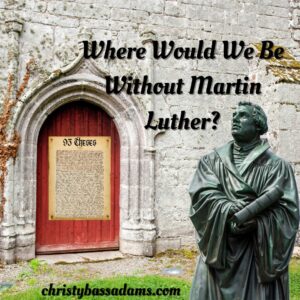Monday, October 31st, marked the 505th anniversary of Martin Luther nailing his 95 Theses to the door of the Catholic Church. Why is this important? Because most of the present-day denominations of faith resulted from this one man standing up for truth and refusing to back down. He single-handedly rewrote history because he was willing to stand up to corruption and not cower.
The Church
The Catholic Church of the Middle Ages was the center of every community, providing activities, hosting orphanages, offering infant baptism and last rights in death. Education, religion, and social activities revolved around the local church. The Catholic Church owned one-third of all the land in Europe and the Pope held more authority than the kings in all the provinces.
Martin Luther became an Augustinian monk after pleading with God and the saints for his life during a horrific thunderstorm. After serving in the monastery for a short time, he was sent on a mission to Rome, where his eyes were opened to sinful practices and open abuses of the church. Many church leaders were involved in prostitution and bribery. And the wide-spread teaching of buying loved ones out of hell or purgatory through the penance of indulgences. These practices enraged Luther.
This trip to Rome sent Luther on a spiritual journey for truth. He wanted to know what the actual bible taught, not what the priests interpreted the bible as saying. He was sent to study at Wittenberg, where he was granted access to the scriptures and eventually became a university professor of religion. This is where his eyes were truly opened to the words of Paul in the New Testament: “Salvation comes through faith, not through good works and prayer.” The “good works” doctrine that the Roman Catholic Church stood upon began crumbling before Martin Luther’s eyes, especially the teaching about the power the ancient relics possessed.
The Breaking Point
 The rubber met the road when a friar came to town selling indulgences. Basically, for a half year’s wage, donated to the Catholic Church, a person could guarantee a spot for themselves or a family member in heaven and receive a piece of paper to prove it. After this deceptive friar coerced his congregation, Luther wrote his famous 95 Theses, which cited all the abuses of the Catholic Church regarding the teaching of indulgences, and counteracted those teachings with God’s truth from scripture (which common people could not read since it was in Latin), and he nailed it to the door of the church on October 31, 1517.
The rubber met the road when a friar came to town selling indulgences. Basically, for a half year’s wage, donated to the Catholic Church, a person could guarantee a spot for themselves or a family member in heaven and receive a piece of paper to prove it. After this deceptive friar coerced his congregation, Luther wrote his famous 95 Theses, which cited all the abuses of the Catholic Church regarding the teaching of indulgences, and counteracted those teachings with God’s truth from scripture (which common people could not read since it was in Latin), and he nailed it to the door of the church on October 31, 1517.
Copies of the 95 Theses were printed and dispersed in common language (over 2000 copies) as Martin Luther openly challenged the teachings of the Catholic Church—pointing out errors, misteaching, and questioning the church’s authority. He made cartoons that also circulated among the everyday parishioners. Basically, the Catholic Church of this time-period had veered off from the original intentions and teachings of the church Jesus taught about and created, and Luther pointed out the many flaws of current Catholicism while backing up every “new” idea with scripture. He even translated the Latin Bible into German, giving common man the opportunity to read the bible for himself, taking away the control of taught doctrine of the Catholic Church leadership. This really made the church leaders angry.
The cost of the Reformation was bloody, leading to hundreds of thousands of deaths through revolts and conflicts across Germany and Europe—it was not the peaceful enlightening Luther hoped for. But as a result of Luther’s firm stand, the errors of the Catholic Church were exposed, and common people gained access to God’s Word. Denominations such as Lutherans, Anglicans, Puritans, Quakers, Presbyterians, Methodists, Anabaptists, and Calvinists along with many others began to emerge across the known world.
The Result
Our faith and doctrine we are allowed to pursue and posses through reading the bible for ourselves is a result of brave men, like Martin Luther, who weren’t afraid to take a stand. As for the Catholic Church, it also reformed and has moved away from the wrong teachings of indulgences that so outraged Luther. The modern-day Catholic Church and all other denominations are free to exist and write their own statements of faith because of Luther.
As I think of Luther’s great display of courage, I can’t help but wonder if that courage still exists today. Are we courageous enough to lay our lives down for a cause that invigorates our souls? Are we ready to lay our lives down for what we believe?
Don’t be silent about the things that matter. Even if it paints a target on our backs, if we stay silent, a generation remains ignorant. Think about that the next time oppression rears its ugly head. Stand for what is right and true, no matter the cost. No matter what.
(information retrieved from: Crash Course video, John Green, “Luther and Protestant Reformation: Crash Course World History #218“)
